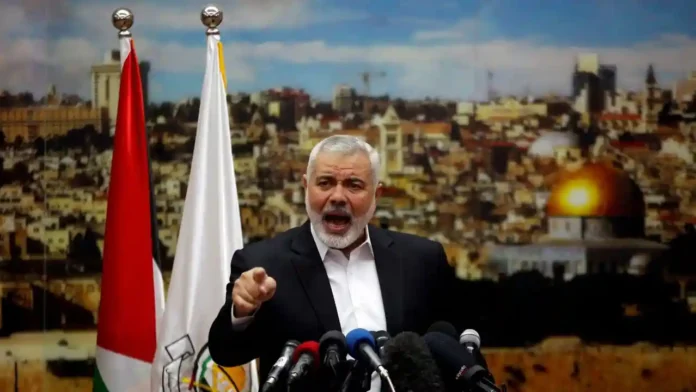Hamas has confirmed that its top leader, Ismail Haniyeh, was killed in an Israeli attack on his residence in Tehran.
The announcement, made by Hamas on Wednesday, has heightened anxieties across the Middle East and elicited swift responses from various international actors.
Confirmation and Reactions
According to Hamas, Haniyeh was fatally struck in what the group describes as a “treacherous Zionist raid.”
The attack reportedly occurred a day after Haniyeh participated in the inauguration ceremony of Iran’s new President Masoud Pezeshkian. This timing has been noted as particularly provocative, intensifying the implications of the strike.
Hamas’s political bureau member Musa Abu Marzuk condemned the action as a “cowardly act” and promised retaliation.
“This assassination by the Israeli occupation of Brother Haniyeh is a grave escalation that aims to break the will of Hamas and the will of our people,” Sami Abu Zuhri, another senior Hamas official, stated, underscoring the group’s resolve to continue its struggle.
The Iranian Revolutionary Guard Corps has acknowledged the incident but has yet to determine the exact cause or provide further details.
Iran’s Foreign Ministry has labeled Haniyeh’s death as “martyrdom,” asserting that it will “strengthen the deep and unbreakable bond between Tehran, Palestine, and the resistance.”
International and Regional Reactions
The attack on Haniyeh has drawn condemnation from various quarters. Both the Russian and Turkish foreign ministries have expressed their disapproval.
The death of Haniyeh follows closely on the heels of another significant development: Israel’s claim of responsibility for the death of Fuad Shukr, a top military commander of Hezbollah, in an airstrike.
This strike was reportedly in retaliation for a rocket attack on the Israeli-occupied Golan Heights over the weekend.
Hezbollah has not yet confirmed Shukr’s death but has reported that a building targeted by the Israeli airstrike in Beirut housed Shukr. The timing of these incidents suggests a period of heightened conflict and retaliation in the region.
Haniyeh’s Background and Legacy
Ismail Haniyeh, 62, was a prominent figure in Hamas and was widely regarded as the group’s overall leader. His involvement with Hamas dates back to the late 1980s, during which he played a significant role in the organization’s activities.
Haniyeh was imprisoned by Israel for three years in 1989 during its crackdown on the first Palestinian uprising. Following his release, he was exiled to a no-man’s-land between Israel and Lebanon.
In 2006, Haniyeh was appointed as Palestinian Prime Minister after Hamas won the majority in national elections.
However, his tenure was marred by conflict with President Mahmoud Abbas and the Fatah party, culminating in his dismissal a year later.
Despite this, Haniyeh continued to govern Gaza, maintaining his position as head of Hamas’s political bureau until his death.
His leadership saw the transformation of Hamas from a militant organization to a key player in Palestinian politics.
In 2018, the US Department of State designated Haniyeh as a terrorist, reflecting his contentious role on the international stage. For the past several years, Haniyeh had resided in Qatar, away from the immediate conflict zones.
Current Situation and Implications
The killing of Haniyeh represents a significant escalation in the ongoing Israeli-Palestinian conflict and broader regional tensions.
The promise of retaliation from Hamas and the condemnation from Iran suggest a period of increased instability.
The international community is closely monitoring the situation, as further retaliatory actions could exacerbate an already volatile environment.
As the situation develops, the impact on regional geopolitics and the potential for further violence remains a pressing concern.
The international community, including organizations like the United Nations, is likely to call for restraint and dialogue to prevent a broader escalation.
Conclusion
Ismail Haniyeh’s death marks a pivotal moment in the ongoing conflict between Hamas and Israel, reflecting the deep-seated animosities and complex dynamics of Middle Eastern politics.
With various factions vowing retaliation and international actors weighing in, the coming days may see heightened tensions and further developments in this volatile region.

